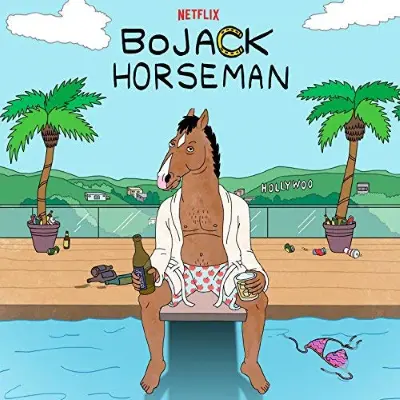BoJack Horseman goes from inward-facing to outward-looking in its final season
-

"BoJack Horseman rarely explores the mechanics undergirding its world of humans and humanoid animals—how humans and animals relate to one another, how they copulate with one another, how they self-identify," says Adrienne Westenfeld. "Yet in this season, the show plumbs new depths of the horse psyche." Westenfeld adds: "In five seasons of Netflix’s BoJack Horseman, we’ve seen BoJack through seemingly every peak and valley of the emotional spectrum, from staggeringly low lows to manic, fleeting highs, but season six introduces the one BoJack we haven’t seen: sober BoJack. In the first half of the show’s sixth and final season, we pick up right where the previous season left off: with everyone’s favorite equine sitcom star checking into seaside rehab, determined to kick his alcoholism and mend fences with the loved ones he wronged. What follows is a standout season where the typically inward-facing show turns outward, widening the lens to ask what we owe one another."
ALSO:
- Don't worry if it sounds like BoJack Horseman is getting a bit too warm and fuzzy: "Its comedic edges remain as pronounced and sharp as ever," says Jen Chaney. "As the show starts down the road to its ultimate finale, it’s going back to its roots in certain ways. Yes, it still explores depression and contains moments of drama and poignancy, but this batch of episodes feels more explicitly comedic than the previous couple of seasons."
- What’s immediately striking about Season 6 is how subdued it seems compared to its predecessors: "The tone of the show is more meditative, almost somber at times," says Danette Chavez, adding: "This may be the weightiest season of BoJack, but introspection has never dulled the show’s humor or sense of fun before, and it doesn’t start now."
- Does BoJack deserve a happy ending?: "In Season 6 we know we're heading for an ending, and there's a tension between what we seem to be getting (a happy one) and what the show has led us to expect (a bleak or ambiguous one)," says Brian Patchett. "A happy ending threatens to betray the show's realism (despite its outrageous sight gags, the characters are written naturalistically), whereas a dark or fatalistic ending could topple the series into the pure cynicism with which it, and its characters, have always flirted."
- BoJack has morphed into a sweet, surreal meditation on the messiness of being alive: "BoJack Horseman has blossomed over the past five years from an unoriginal entertainment satire into something far richer and more profound," says Stuart Heritage. "It has gradually freed itself of its own constraints, organically transforming into a sweet, surreal meditation on sadness, regret and the promise of redemption that lingers tantalisingly out of reach. Every new season nudged it into a new and even more unexpected space, winning yet more critical adoration with each giant step. And then, blammo. Netflix blasts it out of the sky, thinking perhaps that a long-running show will draw fewer new subscribers than a splashy new one."
- BoJack may be the most important—and beloved—animated series since The Simpsons
- Season 6 makes a great choice in focusing on the effects BoJack has had on the people he’s specifically hurt
- BoJack Horseman is the only show that really gets Los Angeles: Raphael Bob-Waksberg and Lisa Hanawalt's Netflix series is the first show to create an entire Los Angeles universe that feels like it was made for people in L.A.
- Ranking BoJack's greatest songs
TOPICS: BoJack Horseman, Netflix, Lisa Hanawalt , Raphael Bob-Waksberg
More BoJack Horseman on Primetimer:- Stealing Boggle Trophies: When Celebrities Take on the Villain Cameo
- By the Numbers: Which Netflix Shows Have Run for 5 Seasons or Longer?
- BoJack Horseman creator responds to Dave Chappelle controversy by revealing a David Fincher joke Netflix forced him to cut to raise money for a trans charity
- The Best UK-Style Holiday Specials on Netflix
